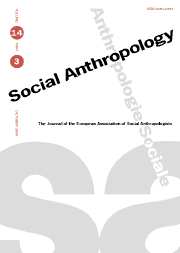No CrossRef data available.
Article contents
Space, ethnicity and capital in reterritorialised Puerto Rican neighbourhoods
Published online by Cambridge University Press: 29 November 2006
Abstract
Ramos-Zayas, Ana Y. 2003. National performances: The politics of class, race and space in Puerto Rican Chicago. Chicago: University of Chicago Press. xvi + 289 pp. Pb.: $21.00. ISBN: 0 226 70359 2.
Dávila, Arlene. 2004. Barrio dreams: Puerto Ricans, Latinos and the neoliberal city. Berkeley and Los Angeles: University of California Press. xi + 260 pp. Pb.: $19.95. ISBN: 0 520 24093 6.
Small, Mario Luis. 2004. Villa Victoria: The transformation of social capital in a Boston barrio. Chicago: University of Chicago Press. 246 pp. Pb.: $21.00. ISBN: 0 226 76292 0.
The three works discussed here all focus on transnational, reterritorialised Puerto Rican communities in the United States by studying the urban neighbourhoods or barrios they live in, using different methods and highlighting different themes in their approaches to the topic. Ana Y. Ramos-Zayas' work studies the dynamics of nationalism and transnationalism in Chicago's Puerto Rican barrio; Arlene Dávila studies processes of gentrification and neoliberal policies in Spanish Harlem, the main New York barrio; and Mario Luis Small uses the case of Villa Victoria, a barrio in Boston, to illustrate the workings of social capital in poor neighbourhoods. All three studies place a strong emphasis on spatial factors, paying special attention to intersections of class, ethnicity or ‘race’, and space in the cities studied. In this, mirroring the cultural turn in geography, these studies indicate a ‘spatial turn’ in anthropology (Low 1996; Low and Lawrence-Zuniga 2003). Especially when researching transnational communities, such efforts to ‘locate culture’, with emphases on the shifting role of space and place, are indispensable. However, many earlier urban anthropological and sociological studies have tended to neglect these aspects of the city, while early Chicago School theories displayed a tendency towards ecological determinism.
- Type
- Review Article
- Information
- Copyright
- Cambridge University Press 2006


